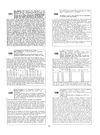 1 citations,
January 2020 in “Recent Research in Genetics and Genomics/Recent Research in Genetics and Genomics ”
1 citations,
January 2020 in “Recent Research in Genetics and Genomics/Recent Research in Genetics and Genomics ” High doses of Lepidium sativum seed extract are toxic and should be used with caution.
 October 1988 in “Pediatric research”
October 1988 in “Pediatric research” Certain maturity signs appear before and after the first release of sperm in boys.
 77 citations,
February 2017 in “Stem Cell Reports”
77 citations,
February 2017 in “Stem Cell Reports” SHISA6 helps maintain certain stem cells in mouse testes by blocking signals that would otherwise cause them to differentiate.
 December 2023 in “Urogenital tract infection”
December 2023 in “Urogenital tract infection” Seminal bacteria can lower sperm quality in subfertile men.
 143 citations,
August 1991 in “Endocrinology”
143 citations,
August 1991 in “Endocrinology” Androgens, like testosterone, are crucial for early testicular descent in rats.
124 citations,
July 1997 in “Journal of Biological Chemistry” Overexpressing a specific enzyme in mice causes hair loss and female infertility.
 15 citations,
October 2012 in “International Urology and Nephrology”
15 citations,
October 2012 in “International Urology and Nephrology” Low-dose finasteride may cause fertility issues, but stopping it can improve sperm quality and lead to pregnancy.
 5 citations,
August 1987 in “Andrology”
5 citations,
August 1987 in “Andrology” Men with low or no sperm count have lower salivary testosterone levels, and saliva testing can measure their testosterone well.
 July 2019 in “Acta Scientiae Veterinariae”
July 2019 in “Acta Scientiae Veterinariae” Removing a testicular tumor in a dog reduced its aggressive behavior and skin problems.
 June 1998 in “Biomedicine & Pharmacotherapy”
June 1998 in “Biomedicine & Pharmacotherapy” Medical treatments like chemotherapy and radiotherapy can harm sperm production, so freezing sperm before treatment is important for men who want children later.

Dutasteride did not change rat spermatogenesis or oxidative stress but needs more research.
 54 citations,
September 2013 in “Fertility and Sterility”
54 citations,
September 2013 in “Fertility and Sterility” Finasteride can reduce fertility in some men, but stopping it increases sperm count.
 49 citations,
August 1996 in “The Journal of Clinical Endocrinology and Metabolism”
49 citations,
August 1996 in “The Journal of Clinical Endocrinology and Metabolism” The combination of cyproterone acetate and testosterone enanthate is highly effective in preventing sperm production and could be a good reversible male contraceptive.
15 citations,
March 2015 in “PloS one” Scientists restored fertility in male mice lacking a key fertility gene by using a modified gene.
 3 citations,
February 2018 in “Human Reproduction”
3 citations,
February 2018 in “Human Reproduction” A man with testotoxicosis was fertile despite low FSH levels, suggesting high testosterone may allow sperm production without FSH.
 1 citations,
May 2011 in “Journal of Human Reproductive Sciences”
1 citations,
May 2011 in “Journal of Human Reproductive Sciences” Finasteride may decrease semen quality but not harm sperm production, and stopping the drug can improve semen quality; hyperprolactinemia can cause infertility but is treatable with medication.
 August 2015 in “Dermatologica Sinica”
August 2015 in “Dermatologica Sinica” Men with severe hair loss may have poorer sperm quality.
 195 citations,
February 2007 in “The Journal of Clinical Endocrinology and Metabolism”
195 citations,
February 2007 in “The Journal of Clinical Endocrinology and Metabolism” Dutasteride and finasteride may reduce sperm count and volume but don't affect movement or shape; effects are reversible after stopping.
 5 citations,
May 2012 in “Andrologia”
5 citations,
May 2012 in “Andrologia” Finasteride use may be linked to rare testicular tumor, but more research needed.
 January 2024 in “Reproductive toxicology”
January 2024 in “Reproductive toxicology” Hesperidin helps protect against testicular damage caused by finasteride.
 10 citations,
October 2008 in “Andrologia”
10 citations,
October 2008 in “Andrologia” Finasteride changes antioxidant enzyme expression, possibly affecting sperm protection in rats.
 2 citations,
February 2020 in “Rivista Urologia”
2 citations,
February 2020 in “Rivista Urologia” Both terazosin and baclofen effectively reduce pain in young men with chronic testicular pain, with no difference in their effectiveness.
16 citations,
January 2017 in “Asian journal of andrology/Asian Journal of Andrology” Men who start puberty later may have lower sperm quality and different hormone levels in adulthood.
 1 citations,
November 1998 in “Journal of Small Animal Practice”
1 citations,
November 1998 in “Journal of Small Animal Practice” The dog had a Sertoli cell tumor, which was successfully removed with surgery.
 55 citations,
July 1999 in “Clinics in Sports Medicine”
55 citations,
July 1999 in “Clinics in Sports Medicine” Athletes use steroids to enhance performance despite health risks and legal issues, and education on their dangers is needed.
 42 citations,
April 2013 in “Steroids”
42 citations,
April 2013 in “Steroids” Non-classic congenital adrenal hyperplasia is a common disorder causing symptoms like acne and infertility, and it's managed based on symptoms, not just test results. Treatment can improve fertility and reduce miscarriage risk.
 35 citations,
June 2005 in “The Milbank Quarterly”
35 citations,
June 2005 in “The Milbank Quarterly” The conclusion is that formalizing how past decisions influence current health technology assessments could improve the credibility and defense of coverage decisions.
 33 citations,
April 2015 in “Current Opinion in Endocrinology, Diabetes and Obesity”
33 citations,
April 2015 in “Current Opinion in Endocrinology, Diabetes and Obesity” 5α reductase inhibitors treat hair loss but may cause sexual side effects and risks.
 29 citations,
December 2012 in “Current Opinion in Endocrinology, Diabetes and Obesity”
29 citations,
December 2012 in “Current Opinion in Endocrinology, Diabetes and Obesity” With careful management, people with congenital adrenal hyperplasia can have successful pregnancies and become parents.
 23 citations,
February 2021 in “Journal of Endocrinological Investigation”
23 citations,
February 2021 in “Journal of Endocrinological Investigation” Betacoronaviruses, like COVID-19, may cause hormone system dysfunction and affect disease susceptibility and severity.



























